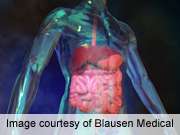(HealthDay)—Colonic diverticular disease does not appear to be linked to an increased risk of subsequent colorectal cancer (CRC), according to research published in the August issue of Clinical Gastroenterology and Hepatology.
Wen-Yen Huang, M.D., of the Tri-Service General Hospital in Taipei, Taiwan, and colleagues conducted a population-based retrospective study of 41,359 individuals diagnosed with colonic diverticular disease to examine its association with subsequent risk of developing CRC. A cohort of 165,436 individuals matched by age, sex, and baseline year were selected as a comparison group.
The researchers observed a significantly higher risk of CRC in the study cohort than in the comparison cohort (hazard ratio [HR], 4.54; 95 percent confidence interval [CI], 4.19 to 4.91; P < 0.001). When the first 12 months of follow-up after the diagnosis of colonic diverticular disease were excluded from the analysis, no significant difference was found between the study and the comparison groups in the subsequent incidence of CRC (15.13 and 15.74 per 10,000 person-years, respectively; adjusted HR, 0.96; 95 percent CI, 0.83 to 1.11).
"Colonic diverticular disease is not associated with an increased risk of subsequent CRC after the first year of diagnosis of colonic diverticular disease," the authors write. "An increased risk was observed in the first year, possibly owing to misclassification and screening effects."
More information:
Abstract
Full Text (subscription or payment may be required)
Journal information: Clinical Gastroenterology and Hepatology
Copyright © 2014 HealthDay. All rights reserved.






















